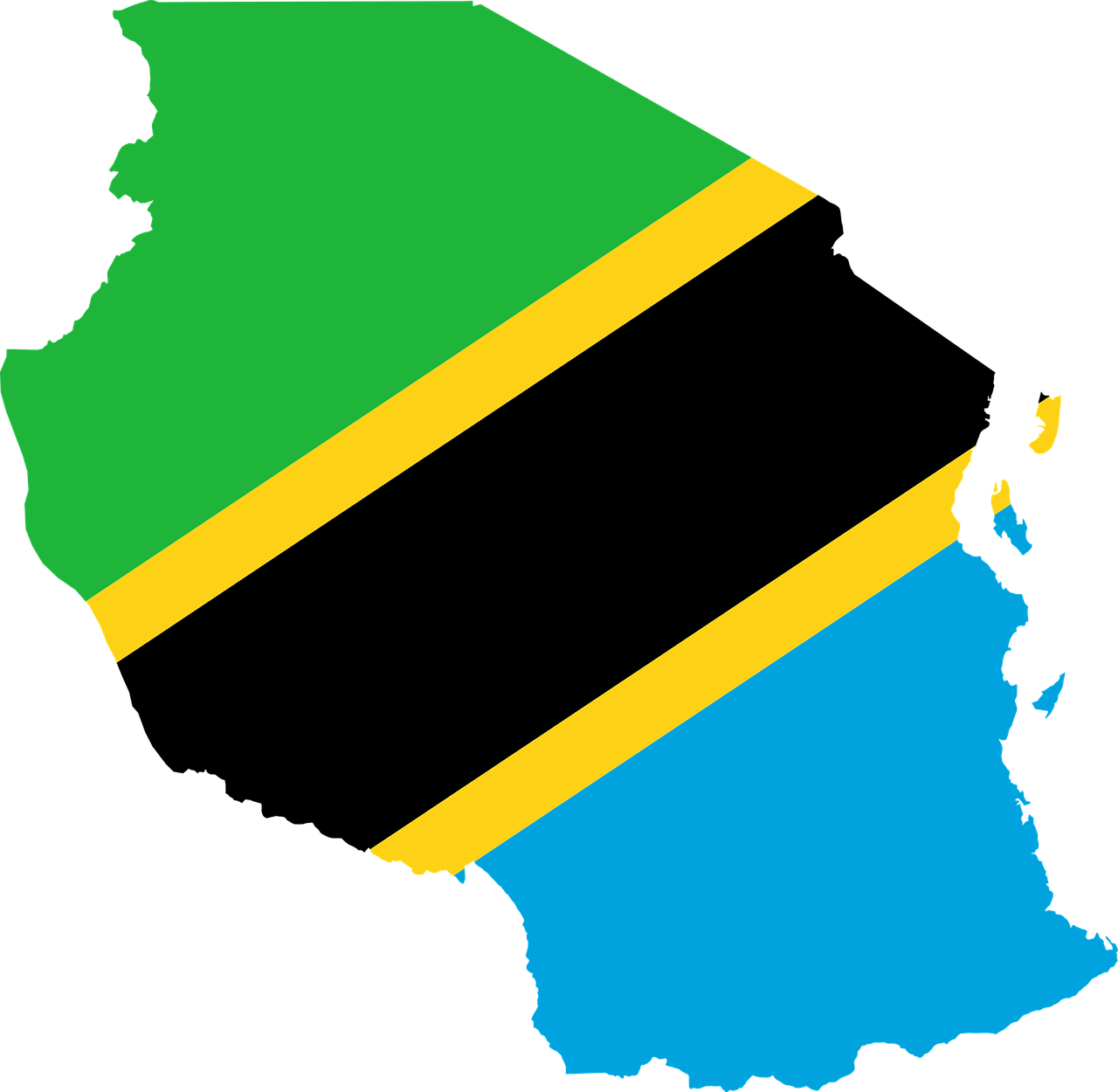Tanzania
Overview
Tanzania, often referred to as the "Soul of Africa," is a land of unparalleled natural beauty and cultural richness. Located on the eastern coast of Africa, it offers a diverse landscape, from the pristine beaches of Zanzibar to the vast plains of the Serengeti, the snow-capped peak of Mount Kilimanjaro, and the depths of the Ngorongoro Crater.
Dar es Salaam, the former capital and the largest city, is a bustling port and Tanzania's economic hub. It reflects the nation's dynamism, growth, and multicultural heritage. Dodoma, the capital, while quieter, stands as a symbol of the nation's aspirations and its political heart. The historic Stone Town in Zanzibar, with its winding alleys and ancient architecture, speaks of centuries of trade, culture, and Swahili civilization.

Key indicators

Population

GDP per capita

Nominal GDP

Purchasing Power Parity GDP

Main exports

Foreign direct investment

Stock market capitalization

GDP growth rate
- Economic Snapshot
- Business Environment
- Startup Ecosystem
- Infrastructure & Technology
- Opportunities & Challenges
- Cultural Insights
anzania's economy, characterized by its agrarian roots, has shown remarkable resilience and adaptability. Agriculture remains the backbone, employing a significant portion of the population. The fertile plains and favorable climate allow for the cultivation of a variety of crops, from coffee and tea to tobacco and cashew nuts. But Tanzania isn't just about agriculture. The discovery of significant natural gas reserves has added a new dimension to its economic landscape, positioning it as a potential energy powerhouse in the region.
Tourism is another pillar of Tanzania's economy. The nation's national parks, such as the Serengeti, Selous, and Tarangire, are world-renowned, drawing wildlife enthusiasts and adventure seekers from across the globe. The annual Great Migration, where millions of wildebeest and zebras traverse the Serengeti plains, is one of nature's most spectacular events. Add to this the cultural tourism of Zanzibar, the historical sites like the Olduvai Gorge, and the adventure tourism of Mount Kilimanjaro, and it's evident why Tanzania is a preferred destination for many.
Tanzania's business environment is a reflection of its economic policies and vision. The government, recognizing the importance of a conducive business climate, has undertaken several reforms. The establishment of the Tanzania Investment Centre (TIC) is a step in this direction, offering a one-stop solution for investors. From business registration to land allocation, the TIC ensures that investors have a smooth experience.
The nation's strategic location, with its access to landlocked countries in the region, enhances its trade potential. The port of Dar es Salaam, one of the largest in the region, is a gateway to East and Central Africa. Furthermore, Tanzania's membership in regional bodies like the East African Community (EAC) and the Southern African Development Community (SADC) offers it access to a larger market and collaborative opportunities.
The winds of innovation and entrepreneurship are blowing across Tanzania. Cities like Dar es Salaam and Arusha are emerging as centers of startup activity. The growth of tech hubs, incubators, and accelerators is a testament to the nation's burgeoning startup culture. From fintech solutions that aim to enhance financial inclusion to agritech startups that seek to revolutionize farming, Tanzanian entrepreneurs are making their mark.
Collaboration is at the heart of this ecosystem. Universities, the private sector, and the government are coming together to foster a culture of innovation. Access to funding, mentorship programs, and market linkages are ensuring that startups not only take root but also thrive and scale.
Infrastructure development is at the forefront of Tanzania's growth strategy. Roads, railways, ports, and airports are receiving significant investments. The government's focus on enhancing digital infrastructure is evident in its push for greater internet connectivity and digital literacy. Mobile money platforms have revolutionized banking in Tanzania, offering financial services to those who were previously unbanked.
The nation is also focusing on sustainable energy solutions. While hydropower remains a significant source, there's a growing emphasis on solar and wind energy. Rural electrification projects, leveraging renewable energy sources, are ensuring that even the most remote areas have access to power.
Tanzania, with its vast resources and strategic location, is a land of opportunities. From mining to agriculture, from tourism to technology, the potential is immense. The government's focus on industrialization, value addition, and export promotion presents numerous avenues for investment.
However, challenges remain. Land ownership issues, bureaucratic hurdles, and infrastructural gaps need to be addressed. But with challenges come opportunities. The nation's youth, with their energy, talent, and aspirations, are its biggest asset, driving change and innovation.
-
Tanzania is a multicultural country with a rich history and heritage. The country is home to over 120 ethnic groups, each with its own unique culture and traditions. The most populous ethnic groups in Tanzania are the Sukuma, the Nyamwezi, and the Chagga.
-
Tanzanians are generally friendly and welcoming. They are also known for their strong sense of community and family.
-
Some of the most important cultural traditions in Tanzania include:
-
Greetings: It is customary to greet people with a handshake and a greeting in their language. The most common greetings are "Jambo" (Swahili) and "Habari" (Swahili).
-
Hospitality: Tanzanians are known for their hospitality. They often invite guests into their homes and offer them food and drinks. It is considered rude to refuse a Tanzanian's hospitality.
-
Dressing: Tanzanians dress in a variety of styles, depending on the occasion. However, it is important to dress respectfully when visiting Tanzania. This means avoiding revealing clothing and dressing appropriately for the occasion.
-
Food: Tanzanian food is delicious and diverse. Some of the most popular dishes include:
- Ugali: A starchy staple food made from cassava, plantain, or millet flour.
- Nyama choma: Grilled meat.
- Wali wa nazi: Rice cooked in coconut milk.
- Chapati: A type of flatbread.
-
Music and dance: Tanzania has a vibrant music and dance culture. Some of the most popular Tanzanian musical genres include bongo flava, taarab, and dansi. Traditional Tanzanian dance is characterized by its energetic and graceful movements.
-
Here are some tips for businesses and investors operating in Tanzania:
- Be respectful of Tanzanian culture and traditions. This includes being respectful of traditional customs and beliefs.
- Be patient and understanding. Tanzanians are generally relaxed and easy-going. It is important to be patient and understanding when doing business in Tanzania.
- Build relationships. Tanzanians value personal relationships in business. It is important to build rapport with your Tanzanian counterparts before getting down to business.
- Be ethical and responsible. Tanzanians are looking for businesses that are ethical and responsible in their dealings.

Investment Landscape & Opportunities in Tanzania
- Start-up & SME Investments
- Impact & Green Investments
- Government Bonds & Stock Market
- Public-Private Partnerships
- Foreign Direct Investments
- Commodities & Infrastructure Investments
- Real Estate Development
- Cultural and Creative Industries

Leading
startups in Tanzania
Comming up soon

